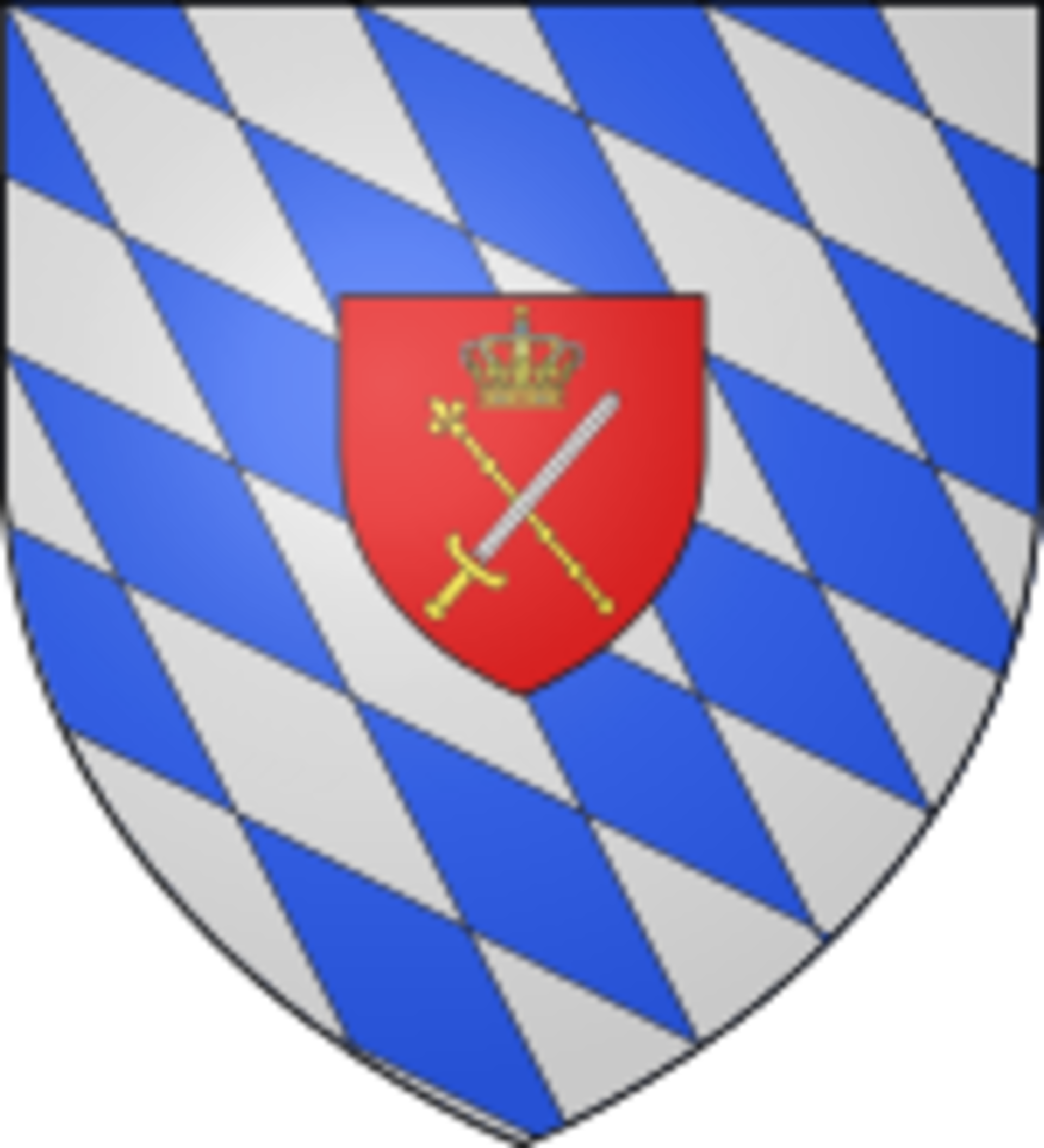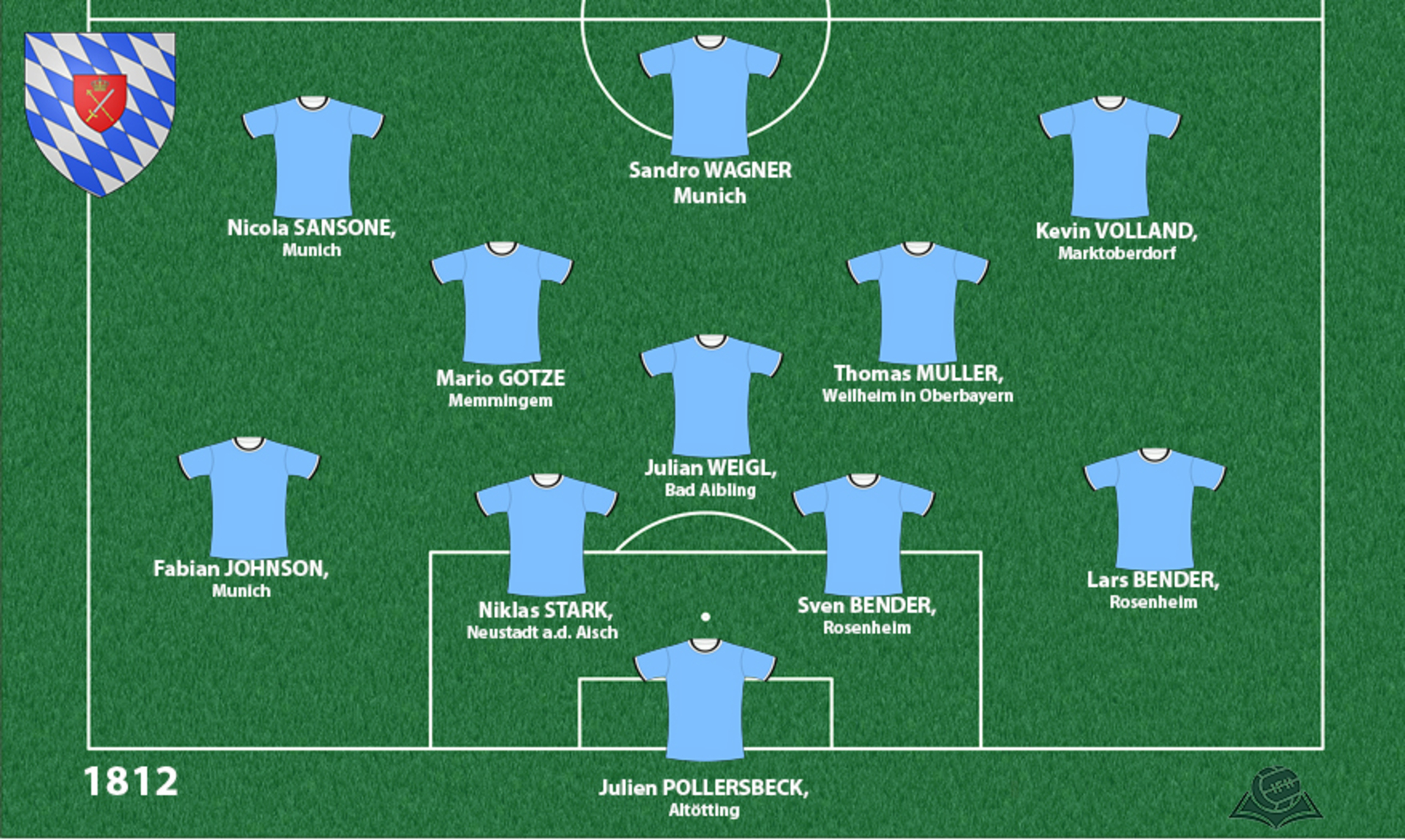Kingdom of Bavaria
Although initially involved in fighting the revolutionary French, the Bavarian authorities soon changed sides, realizing that it was in her interest to have an alliance with the French who then dominated land battles throughout Europe.

Coat of arms

Shirt
| Position | First name | Last name | Mjesto rođenja | Like | Dislike | |
|---|---|---|---|---|---|---|
| GK | Julian | POLLERSBECK | Altötting |
1 |
0 |
|
| DC | Florian | NIEDERLECHNER | Ebersberg |
1 |
0 |
|
| DC | Kevin | DANSO | Voitsberg |
1 |
0 |
|
| DC | Niklas | STARK | Neustadt a.d. Aisch |
1 |
0 |
|
| DLC | Holger | BADSTUBER | Memmingem |
3 |
1 |
|
| DR | Roberto | HILBERT | Forchheim |
1 |
0 |
|
| DR | Stefan | LAINER | Salzburg |
1 |
0 |
|
| DL | Diego | CONTENTO | München |
1 |
1 |
|
| DC/DMC | Sven | BENDER | Rosenheim |
6 |
0 |
|
| DMC | Johannes | GEIS | Schweinfurt |
3 |
1 |
|
| DMC | Julian | BAUMGARTLINGER | Sazlburg |
2 |
0 |
|
| DMC/DC | Stefan | ILSANKER | Hallein |
0 |
0 |
|
| DMC/DR | Christian | TRASCH | Ingolstadt |
0 |
0 |
|
| DMC/DR | Lars | BENDER | Rosenheim |
0 |
0 |
|
| MC | Bastian | SCHWEINSTEIGER | Kolbermoor |
7 |
0 |
|
| MC | Julian | WEIGL | Bad Aibling |
15 |
1 |
|
| MC | Konrad | LAIMER | Salzburg |
1 |
1 |
|
| MC | Marcel | BUCHEL | Feldkirch |
0 |
0 |
|
| ML/DL | Fabian | JOHNSON | München |
0 |
0 |
|
| AMC | Mehmet | EKICI | München |
0 |
1 |
|
| AMRLC | Karim | FREI | Feldkirch |
0 |
0 |
|
| AMRLC | Mario | GÖTZE | Memmingen |
6 |
1 |
|
| AMRL | Alessandro | SCHOPF | Umhausen |
0 |
0 |
|
| SS/FC | Nicolai | MULLER | Lohr am Main |
0 |
0 |
|
| SS/FC | Thomas | MÜLLER | Weilheim in Oberbayern |
19 |
4 |
|
| SS/FRLC | Nicola | SANSONE | München |
3 |
0 |
|
| FRLC | Kevin | VOLLAND | Marktoberdorf |
0 |
0 |
|
| FRLC | Lukas | HINTERSSER | Kitzbühel |
0 |
0 |
|
| FC | Sandro | WAGNER | München |
1 |
0 |
|
| FC/SS | Stefan | KIEßLING | Lichtenfels |
5 |
0 |
(Today part: Bavaria and Baden Wuttenburg in Germany, western Austria)
After the battles with Ulm and Austerlitz (1805), Bavaria would be granted Kingdom status. Along with the principalities and dukes of the Rhine Confederation, Bavaria was one of Napoleon's most reliable allies because it was in her interest to weaken the power of the Habsburg Emperor. Numerous internal reforms followed: a legal code modeled on Napoleon's Civil Code was introduced, religious orders were restrained, the Church's privileged position in education was reduced, etc. Also, during the Napoleonic wars, Bavaria achieved a sudden and significant territorial expansion in the form of areas that had their own, separate culture, including Swabia and much of France, which also resulted in the Bavarians becoming just one part of the entire nation that inhabits Bavaria.
One of their main identity features was Catholicism, while, for example, their linguistic and cultural similarities are greater with neighboring Austria than with the rest of the former Holy Roman Empire. By timely altering the pages of 1813, Bavaria also benefited from the fall of Napoleon, so that it would retain most of the territory acquired and secure its independent status in the future post-Napoleonic world, that is, in the German Union into which it entered.
Sources
- Felipe FERNANDEZ-ARMESTO, Narodi Europe, Zagreb, 1997.
- David NICHOLLS, ''Napoleon: A Biographical Companion'',https://books.google.hr/books?id=PmCdv91zPS0C&pg=PA18&lpg=PA18&dq=KINGDOM+BAVARIA+NAPOLEON&source=bl&ots=JMBBfOKrPn&sig=5h8-HQs6HmRqAzOd06zohb2wBT8&hl=hr&sa=X&ved=0ahUKEwjhkJyum4TKAhWCIA8KHYFmC1EQ6AEIWTAM#v=onepage&q&f=false
- ''Kingdom of Bavaria'', https://en.wikipedia.org/wiki/Kingdom_of_Bavaria
- Coat of arms https://en.wikipedia.org/wiki/House_of_Wittelsbach
